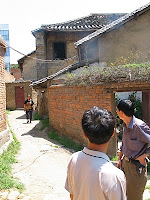(California Post #3)History of my novel, Friday 10:03 (Part 11): a California novel
Monday, January 21, 2008
(This series begins here.)
I recall a program on the history of Rock and Roll in which one of the greats (I remember it being Lou Rawls) was asked (in discussing the Righteous Brothers), “Can white guys have soul?” Rawls just chuckled in a way that said: That’s too silly a question to even answer.
I take comfort in that, because for me, the parallel question is, “Can a white guy write ethnic literature?” I contend that if it is theoretically possible, I am a pretty likely candidate to accomplish it. Beginning in high school, I have been a serious student of immigration and the interaction of cultures—not just here, but world wide. In college, I took Japanese, tutored English in Chinatown, specialized in the history of China and Japan, and was elected an “Honorary Asian” in order to serve as a summer-camp counselor at an “all Asian” camp. Then I married into a Mexican-American family, switched to studying Spanish, and divided 28 years between living in Latin America and teaching in predominantly Mexican-American communities in California.
For that reason, I really liked a comment I read in a recent discussion in BOMB MAGAZINE between novelists Gabriela Jauregui, Daniel Alarcón, and Alex Espinoza. Alex is one of the professors on my thesis committee, and all three get pegged as Chicano Novelists. Part of the discussion addresses the very existance of subsets to American Literature, but I especially liked this comment by Alarcón:
Storytelling is, at its essence, how human beings create tribe. It comes from this entirely human need. If we share the same story, if we know the same characters, the same histories, the same myths, then we’re the same. It all goes back to the need to create connection between humans, so that we can separate ourselves: “us” from “them.” Ideally, what the universalization of literature does is create a bigger “us” and a smaller “them.”
For the ‘us’ to get bigger and the ‘them’ to get smaller, I believe there must be writers on both sides writing in the margins that currently exist between groups. By writing from within those margins, I can help introduce my friends on one side to my friends on the other side—friends who might not otherwise meet. I’ve said that Friday 10:03 is a California novel. Because California is—and always has been—a place of ethnic interaction, I believe the same must be true of any California novel. And even a white guy can do it.




